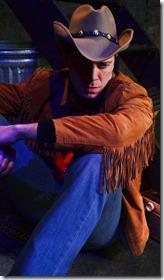
New adaptation has grand scope but fizzles trying to create
appropriate atmosphere
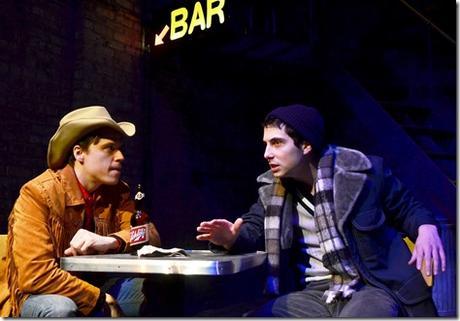
There's a throwaway line in the first act of Chris Hainsworth's new adaptation of wherein a woman with a small amount of power over another perfectly surmises the tragic inverse of the American Dream. "Why," she asks with only a resigned air of necessity, "would I give you the one thing you're willing to pay for?"
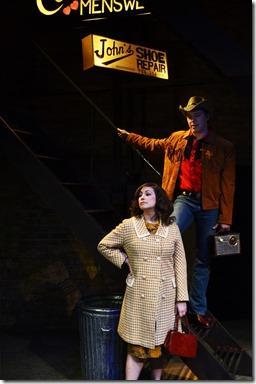
After viewing Hainsworth's take, I decided to read the James Leo Herlihynovel. I found with some surprise that the above line does not exist there in this otherwise very faithful interpretation. There are others, but this one stuck out to me as an interesting addition. The closest Herlihy line philosophically may be that "that's the way in which power is usually tasted, in the abuse of it." Written in 1965, "Midnight Cowboy" had the misfortune of being overshadowed by its Oscar-winning progeny in 1969. That's a shame because it lives up to its reputation as one of the great post-WWII novels. It's a reverse Western wherein the lonesome cowboy is not a hero and, instead of going West, this young man goes East. He's a salmon swimming against the current of manifest destiny blissfully unaware of the bears waiting to eat him alive.
Unremarkable in every way but his looks, the cowboy in question is Joe Buck (Zach Livingston). He's not really a cowboy, more of an amalgam of identities he's pieced together from a wandering, nontraditional life. His origin is not unlike a later fictional man who went to New York to make his fortune- Don Draper. Both were raised in whorehouses and pieced together artificial constructs that they used to seduce women.
Joe's dream is to be a successful Don Juan for pay. With his fringed coat and new boots, he's leaving Houston to take on the women of the Big Apple with his big....sense of adventure. He's not a man-child in the same way that Forrest Gump is, it's more that his early life left him unable to form and hold complex thoughts. He's a lunkhead through and through, and it doesn't take long for the grist mill of 1960s NYC to begin grinding out what little life he has. Everyone is a masochist just beneath the surface, looking for a sadist to fulfill desires even they can't admit they have. It's not enough to be an eager beaver eager for beaver, he lacks the adroitness to approach the client or recognize someone taking advantage of him.
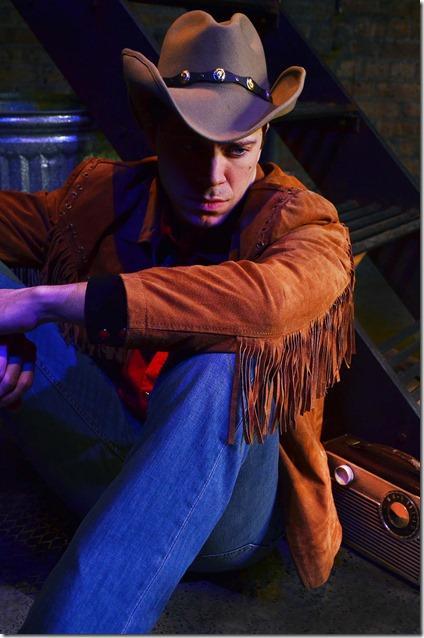
In desperation for a Virgil in his own version of Hell, he turns to a young crippled boy several years his junior, Rico "Ratso" Rizzo (Adam Marcantoni), a homeless grifter. He first treats Joe as a 20-dollar mark-leading him to a "pimp" (Gregory Madden) who turns out to be a street preacher-only to later become the only friend he has.
Flashbacks are a Hainsworth introduction to Herlihy's mostly straightforward story. This leads to a lack of mooring in the narrative thrust as audiences may find themselves uncertain as to what part of Buck's history they are viewing and then piecing that back into what they know. If you don't read the program, you may be confused to learn that part of the first act takes place two years prior to the main story. Act one shuffles its feet shyly as it gears up for a more robust second act. Key insights like Joe's melancholy dream of loneliness are moved from the beginning to the end.
We are also caught in a newly written sermon that is ostensibly the one being preached at Joe his first night in the city. Madden regularly takes the stage in his grimy shirt and robe to preach the word of the missing 'beatitudes of loneliness'. If the preacher is right, and loneliness is the gateway to all modern sin, only in his dysfunctional relationship with the sickly Ratso can Joe find any kind of sacrament. It should be noted that Herlihy was a beautiful writer but far from subtle, and Hainsworth's preacher becomes a similar drumbeat for the theme of isolation and its consequences that drive the point home a little too repetitively.
Joe Schermoly is a set designer with considerable talent, but here his skills don't create a NYC of ominous, oppressive power that becomes its own character. This is partly due to the smallness and constraints of the Lifeline stage itself, and this production suffers from the same issues as their . Scale is critically important to telling this tale and to lose it means losing some of our immersion into this story. More successful is Brandon Wardell's lighting which, among other things, does a fantastic job creating a deathlike pallor at a critical moment.
As fresh-faced as they come, Livingston is deft at portraying an outwardly awkward, shy man prone to tantrum-like outbursts of anger driven more by confusion than malicious intent. He has to be both empathetic and detestable and succeeds at both. Marcantoni takes the role that made Hoffman a two-hit wonder and makes it his own, bursting with nervous energy and sycophantic awe. They craft a believable chemistry as a dark addition to the American odd couple tradition. Unfortunately a large part of the first act contains a miscast Jack Miggins as Perry, who doesn't project the right tone of world-weary ennui and menace necessary for one of Joe's first instructors in the world of dominating a "client."
As Netflix's documentary "Hot Girls Wanted" demonstrates, the world still contains plenty of young naïfs willing to trade a spirit of self-determination for money only to find the cost of humanity may be more than they can pay. Interestingly, they now go to Florida with that dream, the same place Joe and Ratso believe will be their ultimate escape from their nightmare. The grist mill grinds on.
Midnight Cowboy continues through April 10th at Lifeline Theatre, 6912 N. Glenwood (map), with performances Thursdays-Fridays at 7:30pm, Saturdays 4pm and 8pm, Sundays 4pm. Tickets are $40 (seniors/military $30, students w/ ID $20), and are available by phone (773-761-4477) or online through PrintTixUSA.com (check for half-price tickets at Goldstar.com ). More information at LifelineTheatre.com. (Running time: 2 hours 30 minutes, includes an intermission)
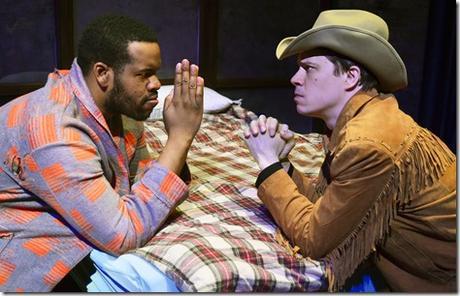
Zach Livingston (Joe), Patrick Blashill (Woodsy, Towny), Megan DeLay (Cass, Orange Dress), Micah Kronlokken (Bobby, Eddie, Hansel), Anne Marie Lewis (Sally), Gregory Madden (O'Daniel), Adam Marcantoni (Ratso, Marvin, Steve), Jack Miggins (Perry, Adrian), Heather Smith (Anastasia, Dolores, Gretel)
behind the scenes
Christopher M. Walsh (director), Joe Schermoly (scenic design), Rachel Sypniewski (costume design), Brandon Wardell (lighting design), Lindsey Miller (stage manager), Matt Engle (fight director), Sarah Espinoza (sound design), Elise Kauzlaric (dialect coach), Theresa Kelly (assistant lighting design), Ryan McCain (properties design), Patrick Runfeldt (dramaturg), Suzanne Plunkett (photography)
Tags: 16-0264, Adam Marcantoni, Anne Marie Lewis, Brandon Wardell, Chicago Theater, Chris Hainsworth, Christopher M. Walsh, Clint May, Elise Kauzlaric, Gregory Madden, Heather Smith, Jack Miggins, James Leo Herlihy, Joe Schermoly, Lifeline Theatre, Lindsey Miller, Matt Engle, Megan Delay, Micah Kronlokken, Patrick Blashill, Patrick Runfeldt, post, Rachel Sypniewski, Ryan McCain, Sarah Espinoza, Suzanne Plunkett, Theresa Kelly, Zach Livingston
Category: 2016 Reviews, Adaptation, Clint May, Lifeline Theatre, New Work, World Premier

